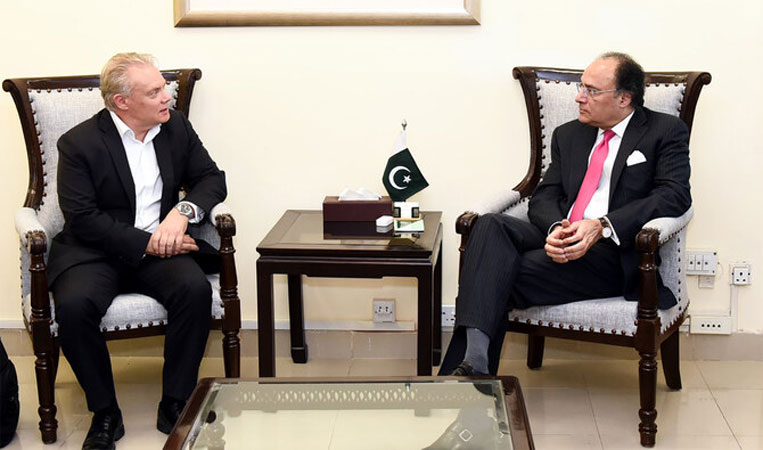 Finance Minister Muhammad Aurangzeb on Tuesday reiterated the federal government’s commitment to make Pakistan’s investment climate “favorable and conducive” for foreign investors as the South Asian country struggles to meet external financial needs to get approval for a $7 billion IMF bailout loan and fights a growing militancy problem.
Finance Minister Muhammad Aurangzeb on Tuesday reiterated the federal government’s commitment to make Pakistan’s investment climate “favorable and conducive” for foreign investors as the South Asian country struggles to meet external financial needs to get approval for a $7 billion IMF bailout loan and fights a growing militancy problem.
Last month, Aurangzeb said Pakistan will focus on meeting its external financing needs by speaking with foreign governments and lenders to draw foreign investment as well as seeking loan rollovers. The government is also seeking to focus on more sustainable forms of external financing such as direct investment and climate financing.
Pakistan and the IMF reached an agreement for the 37-month loan program last month. The IMF has said the program is subject to approval from its executive board and obtaining “timely confirmation of necessary financing assurances from Pakistan’s development and bilateral partners.”
On Tuesday, Aurangzeb met Antti Partanen, a representative from Finn Fund, a Finnish development financier, who called on the finance minister in Islamabad. “The meeting focused on exploring potential investment opportunities in Pakistan,” Radio Pakistan reported. “The Finance Minister highlighted the government’s focus on transforming Pakistan into an export-led economy and attracting Foreign Direct Investment to enhance the country’s export base.”
Radio Pakistan said Partanen presented an overview of FinnFund’s profile and investment initiatives in Pakistan, emphasizing the firm’s interest in digital infrastructure, renewable energy, agriculture, and forestry. “He noted that Pakistan’s growing young population makes it an attractive destination for financing and expressed the Fund’s willingness to explore investments in various sectors of the country.” Aurangzeb has held a flurry of meetings with heads of foreign banks and companies in recent weeks in a push to bring in more investment. Last week he held meetings with top officials of Dubai Islamic Bank and Mashreq Bank to “discuss the economic outlook and explore investment opportunities in Pakistan.”
Pakistan is in talks with Saudi Arabia, the United Arab Emirates and China to meet gross financing needs under the IMF program, Aurangzeb said in July following a trip to China to seek energy sector debt reprofiling.
Rollovers or disbursements on loans from Pakistan’s long-time allies, in addition to financing from the IMF, have helped Pakistan meet its external financing needs in the past. Tough conditionalities placed by the IMF, such as raising tax on agricultural incomes and lifting electricity prices, have prompted concerns about poor and middle class Pakistanis grappling with rising inflation and the prospect of higher taxes.
Bringing in foreign investors might also become harder as Pakistan’s security situation deteriorates. On Sunday, separatist militants launched several coordinated attacks in the southwestern province of Balochistan, killing over 53 people, including at least 19 soldiers and police. Attacks across the country by religiously motivated groups like the Pakistan Taliban have also been on the rise in recent months.